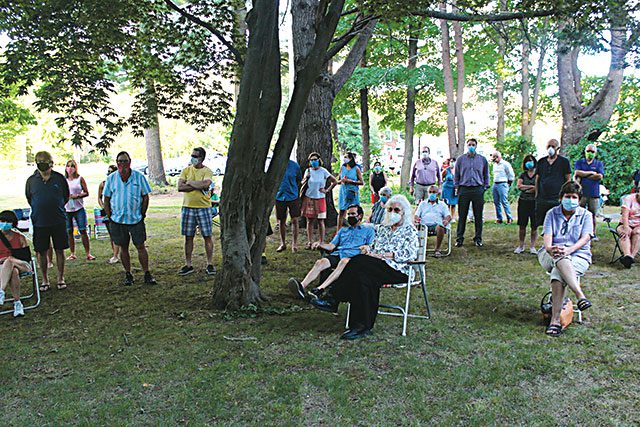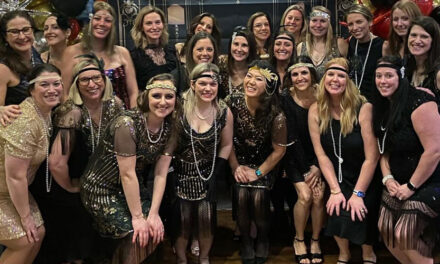Published August 5, 2020

FIFTY RESIDENTS attended the Historical Commission’s July 29 meeting to voice their opposition to Lynnfield Virgil Properties’ proposal to raze Smith Farm, 163 Lowell St. (Dan Tomasello Photo)
By DAN TOMASELLO
LYNNFIELD — The old Joseph Smith house, 163 Lowell St., is staying put for at least the next year.
The Historical Commission voted 4-0 on July 29 to authorize the use of the Demolition Delay Bylaw (DDB) in order to hit the brakes on Virgil Lynnfield Properties, LLC’s request to raze Smith Farm for one-year as allowed by the bylaw.
Virgil Lynnfield Properties manager Paul Marchionda and Boston Clear Water Company owner Anthony Gattineri did not attend the public hearing about their request to remove Smith Farm from DDB protection. According to The Warren Group, former residents John and Heather Sievers sold the 163 Lowell St. home to BCW for $860,000 on Nov. 25, 2019.
The commission’s consultant, John Clemson, said he examined the home before the Sievers sold Smith Farm to Boston Clear Water Company last November. He said the home was built around 1850.
“This house was built in the late Federal and Greek Revival periods,” said Clemson. “We refer to them as ‘L Houses.’ The Smith family was there for hundreds of years. I am recommending that this property be placed on the National Register of Historic Places.”
Fifty residents attended the meeting, which was held in front of the Historic Centre on South Common Street. All of the residents who spoke said they did not want Smith Farm to be torn down.
A man in the audience asked why the commission couldn’t just vote to authorize the use of the Demolition Delay Bylaw in the wake of Gattineri and Marchionda deciding not to attend the meeting.
“We have ended up in litigation with Boston Clear Water every step of the way,” said Town Counsel Tom Mullen. “If we are going to end up in litigation about this, I want to make sure that we dot every I and cross every T. The bylaw calls for a hearing, and I ask you for your patience at this hearing.”
Mohawk Lane resident Gail Caputo asked what Boston Clear Water plans to do with the property.
Historical Commission Chairman Kirk Mansfield said Marchionda stated on an application that Virgil Lynnfield Properties wants to raze the home for “personal reasons.”
“That’s it,” said Mansfield. “That’s why we were hoping they would be here to answer questions.”
Historical Commission member Roy Sorli said Marchionda’s answer on the application is “unacceptable to the commission.”
“We are entitled to ask the owner what they want to do with the property,” said Sorli.
Merrow Road resident Amy MacNulty and Juniper Road resident Fernand Lavoie both asked whether Virgil Lynnfield Properties is allowed to work on the home while the matter is before the commission.
Sorli said the Historical Commission will allow Virgil Lynnfield Properties to maintain the property.
“If they do any demolition, then we go to a separate part of enforcement, which will not allow them do any work at all on any attached property for two years,” said Sorli.
Mullen agreed.
“If they were to demolish all or part of the building during the coming year, the commission could order what has been demolished to be restored,” said Mullen. “And for a period of two years after any demolition, neither that property nor any adjoining property under common ownership would be entitled to a building permit for any purpose.”
Mullen added that contractors are allowed to work inside the home.
In response to a question from Mansfield, Mullen said the Demolition Delay Bylaw will allow the commission to designate Smith Farm as a “preferably preserved significant structure.”
“That means it cannot be demolished for one-year,” said Mullen. “The bylaw we have in Lynnfield is as broad of a bylaw as I have seen in any town. People think there is some kind of law that prohibits the destruction of a historic property. There isn’t. That property could be on the National Register of Historic Places, and it wouldn’t matter. The owner has the right to demolish it. The only way to prevent demolition on the part of an owner who chooses to demolish a structure is to delay the demolition, which is what our bylaw does.”
Pocahontas Way resident Paul Woods asked what happens if Marchionda and Gattineri refuse to work with the Historical Commission as part of an effort to preserve Smith Farm.
“If he just sits there for a year, is that house history?” Woods asked.
Mullen said yes.
“The purpose of the bylaw is to give some breathing space so people interested in preservation might be able to find what is called a white knight, who is somebody willing to come in, buy the property and preserve it,” said Mullen. “It is one thing to find somebody to pay a fair price for the property, but we can’t force any owner to sell. We cannot forbid any owner from demolishing this property into perpetuity. The only alternative is having Town Meeting approve taking the property by eminent domain, which we are not talking about this evening, which is something we are not talking about this evening.”
Selectman Phil Crawford asked what steps the town needs to take in order to acquire Smith Farm by eminent domain.
Mullen said the Board of Selectmen would need to approve a warrant article for Town Meeting or a citizens’ petition would need to be filed for the legislative body to consider. He said citizens’ petitions for the spring and fall sessions of Town Meeting must have at least 10 signatures, and Special Town Meetings require 100 signatures.
“To force the selectmen to call a Special Town Meeting for just this issue, it would take 200 signatures,” Mullen added.
Mullen said the home would need to be appraised before Town Meeting votes on taking the property. He said a two-thirds vote would be required in order to acquire Smith Farm by eminent domain.
“Once we get an appraisal and Town Meeting approves taking the property by a two-thirds vote, the taking would be authorized,” said Mullen. “The selectmen would then sign an order of taking that would get recorded with the Register of Deeds. At that point, the town owns the land. And from that point, the owner has a right to sue the town if the owner contends the property is actually worth more than what he is being paid.”
Sorli said Smith Farm should be preserved.
“Losses of this sort cannot be undone,” said Sorli. “Structures lost cannot be rebuilt. We on the commission must apply objective criteria to work within our ordinances and to designate, according to best practices, those opportunities for preservation that reflect the values of the greater community.”
Historical Commission member Bob MacKendrick concurred with Sorli’s viewpoint.
“This is why the Demolition Delay Bylaw was put into place,” said MacKendrick. “In the 12 years it has been in effect, it has benefitted the town. I think Smith Farm is a preferably preserved significant structure.”
After the discussion, the Historical Commission voted to designate Smith Farm as a preferably preserved significant structure and that demolishing the home would be detrimental to the town’s historical and architectural heritage.




